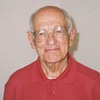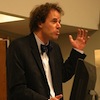Historian's Take: The First Presidential Debate
 Ruth Rosen, a former columnist for the Los Angeles Times and San Francisco Chronicle, is a Professor Emerita of History at U.C. Davis and a scholar in residence at the Center for the Study of Right-Wing Movement at U.C. Berkeley. Her most recent book was “The World Split Open: How the Modern Women’s Movement Changed America.”
Ruth Rosen, a former columnist for the Los Angeles Times and San Francisco Chronicle, is a Professor Emerita of History at U.C. Davis and a scholar in residence at the Center for the Study of Right-Wing Movement at U.C. Berkeley. Her most recent book was “The World Split Open: How the Modern Women’s Movement Changed America.”
For weeks, President Obama and former Governor Mitt Romney have sparred with partners, immersed themselves in piles of position papers, practiced remaining cool, and in the case of Romney, memorized unforgettable zingers that he never used. But each knew they had the same task: to persuade viewers that they genuinely cared about the lives of ordinary Americans.
To do that, Obama had to justify his record, sound like a president instead of a professor, and to explain that the same Republican policies advocated by Mitt Romney caused the economic crisis he inherited. Obama did avoid sounding professorial, but he failed to explain the Republican origins of the American’s financial crisis in a crisp and lucid manner.
As the debate began, the president already enjoyed a substantial lead of 3-5 percent in polls a week before the debate began. His biggest mistake before the debate was his failure to publicize the considerable accomplishments achieved by his administration. These included saving the auto industry, preventing a depression and bank run by helping the financial industry, creating thousands of jobs through government-sponsored programs, promoting the rights of American-born children of immigrants from deportation, supporting same-sex marriage, signing legislation that guaranteed women’s pay equity with men, promoting health care legislation, commonly called “Obamacare,” that will provide medical insurance for almost all Americans, ending the “gag rule” that prevented funds for family planning around the world, supporting women’s reproductive choices and health, providing federal funds to Planned Parenthood, and promoting fairer loans to college students.
During the debate, he again failed to emphasize these accomplishments. Nor did he aggressively attack how much Senate Republicans had systematically blocked his efforts to create a safety net to protect the vulnerable, the disabled, students and the elderly.
Obama exuded confidence and looked comfortable in his own skin. At times, thought, he seemed weary, even glum, at having to address Romney’s misleading statements. His demeanor was that of a tired wonk, who wished he were celebrating his twentieth marriage anniversary with Michelle. But when he flashed his infectious grin, viewers saw the charming and charismatic candidate they had elected in 2008.
Mitt Romney, on the hand, appeared articulate and aggressive, but not particularly charming or personable. Far too often, he smirked while Obama spoke about his plans for the future. For Romney, the task was to shed the image that he was a wealthy ally of the Tea Party that seeks to cut taxes for the wealthy and cut services for the poor. To win the primary, he had moved to the far right, even criticizing the universal health care program he created in Massachusetts, promising to repeal Obamacare, and changing his view from supporting women’s reproductive choice to denouncing abortion.
Now, speaking before the whole nation, Mitt Romney tried to portray himself as a moderate, even as he blamed President Obama for everything that was wrong with America. The political baggage Romney brought to the stage was considerable. First, he chose a vice-presidential candidate, Wisconsin Republican Congressman Paul Ryan, who famously wrote a budget that would replace Medicare—health care for Seniors-- for a private voucher plan, and whose tax plan would cut the taxes of the wealthy
During the debate, Mitt Romney tried to persuade Americans that he feels their pain and cares about the middle class and “working families,” an American euphemism for the working class and the poor. But it seemed inauthentic. He has repeatedly said that people must take individual responsibility for their own lives, and that they should not expect the government to provide them food, education, health care or shelter.
I don’t think Romney really had much of a chance of changing viewers’ image of him. Just recently, Mother Jones, an investigative magazine, released a video of Mitt Romney addressing wealthy donors at a $50,000-a-plate dinner. The video revealed Mitt Romney’s candid lack of compassion for half the population. He said that that forty-seven percent of Americans who support Obama are “victims” who are "dependent upon government" and "pay no income tax." He then added,” I'll never convince them they should take personal responsibility and care for their lives." The video went viral and undermined his last-minute efforts to portray himself as a moderate who identifies with ordinary Americans. Oddly, Obama never mentioned this video, nor Romney’s low rate of taxes, or the stash of money he has hidden in the Cayman Islands.
As the debate began and the candidates started to spar, they carried all this political baggage on to the stage. At stake were two distinct views of American society. Obama explained that government should help those who are vulnerable and suffering from layoffs, outsourcing of jobs, and the loss of their homes. (Obama’s failure to help enough foreclosures, however, made him vulnerable on this issue.) Mitt Romney tried hard to wiggle out of his repeated statement that Americans should expect nothing from the government. He did manage to look like a compassionate conservative, but one who believed that the market would take care of all problems.
Shockingly, neither Obama nor Romney gave women any reason to vote for them. In fact, they never mentioned them. At present 60 percent of American women support Obama, largely because every one of his policies seeks to help families, support women’s rights, contraception and reproductive choice and educate their children. Yet Obama took women for granted and mentioned nothing about their lives. Romney, for his part, also said nothing about women. Afterwards, I did not hear any “spinners” note this astonishing fact.
Among the viewers who watched the first debate were millions of men and women who have lost their jobs and homes, and live with gut-wrenching uncertainty about the future of their families. Mitt Romney, who believes that individuals are on their own, did nothing to reassure them that he wants to help them. Obama, on the other hand, gave people hope that the community and the government can strengthen the safety net and improve their lives, a view that appeals more to women than men. One promised a lonely uncertainty and disparaged assistance as an “entitlement.” The other offered the comforting vision that you are not alone and that you’ve got an entire nation behind you.
In the end, neither candidate dominated the debate and I doubt that the dense discussions of taxes and deficits change the minds of many voters.
* * * * *
 Gil Troy is Professor of History at McGill University, and the author, most recently, of The Reagan Revolution: A Very Short Introduction, (OUP) and Why Moderates Make the Best Presidents: George Washington to Barack Obama . His other books include: Hillary Rodham Clinton: Polarizing First Lady and Morning in America: How Ronald Reagan Invented the 1980s. He is a member of the advisory board of HNN. His website is giltroy.com. His next book “Moynihan’s Moment: America’s Fight against Zionism as Racism” will be published this fall by Oxford University Press.
Gil Troy is Professor of History at McGill University, and the author, most recently, of The Reagan Revolution: A Very Short Introduction, (OUP) and Why Moderates Make the Best Presidents: George Washington to Barack Obama . His other books include: Hillary Rodham Clinton: Polarizing First Lady and Morning in America: How Ronald Reagan Invented the 1980s. He is a member of the advisory board of HNN. His website is giltroy.com. His next book “Moynihan’s Moment: America’s Fight against Zionism as Racism” will be published this fall by Oxford University Press.
Barack Obama’s listless and hesitant performance in the first debate gave Mitt Romney a twelve-day gift. Until their next debate on October 16, we can expect a turn toward more positive coverage of Romney and his campaign. The insta-polls suggest that Romney’s confident, upbeat, persistent point-making in the debate paid off -- and the pundits agree. Words like “zombie,” “throat-clearing,” “downward glancing,” “disjointed,” “convoluted,” popped up in the post-debate reviews of Obama’s performance.
But just as Romney’s people went in hoping to recreate the Carter-Reagan debate, which shifted the winning margin to Ronald Reagan in 1980, Romney’s people should remember Walter Mondale’s victory over President Reagan in the first debate of 1984, and John Kerry’s victories over President George W. Bush twenty years later. Debates can be determinative but rarely are. Obama is perfectly capable of coming back. And the election remains close with sobering swing state math for Romney.
Yet while this kind of handicapping is what generates the headlines, the real headline should be that the debates once again worked. They offered substantive exchanges that focus much more on issues, statistics, and philosophy than the passing gaffes which reporters are forever seeking in their perpetual “gotcha” game. Not only did both candidates come across as smart, caring, patriotic individuals who love America and are trying to do their best, they shifted the campaign discussion from nonsense to substance. The debates, with each question triggering a tidal wave of details, invite looks at the candidate’s philosophies, their visions of government, their plans for the next four years. The silly sideshows from partisan extremists look absurd in contrast to the high-level discussion Jim Lehrer conducted so well. It is hard after ninety minutes of such seriousness and intensity to return to questions about Obama’s birth or Romney’s riches. The questions and the answers got me -- and I daresay most Americans -- thinking about who is right and who is wrong, who will be more effective, what are they offering the American people -- and what pressing issues remain unaddressed. And so, ultimately, while Obama did give Romney this twelve-day gift, even more important is that both Barack Obama and Mitt Romney gave the American people an even greater gift, at least ninety minutes befitting the majesty of the country and the needs to this moment.
* * * * *
 Bernard A. Weisberger is a distinguished teacher and author of American history. He has taught at several American universities, including the University of Chicago and the University of Rochester, where he served as chair of the history department.
Bernard A. Weisberger is a distinguished teacher and author of American history. He has taught at several American universities, including the University of Chicago and the University of Rochester, where he served as chair of the history department.
I bring to this forum the viewpoint of a thoroughgoing skeptic on the value of these debates. They are, of course, scripted and hyper-supervised television performances, particularly since taken over a few years ago by the bipartisan commission run by the Republicans and Democrats. This guarantees that no third party or independent candidate (at least since Ross Perot) will ever present alternative points of view and that moderators will be familiar journalistic faces long steeped in the ways of Washington. And the format of allowing two-minute answers to questions and ten more for "discussion" tilts the whole ninety minutes towards an exchange of sound bites and boilerplate. Defenders argue that they are the first chance for voters to really know the candidates as they go head to head. It may well be so for some viewers who have ignored the entire election until this Super Bowl moment but for anyone who has been following the campaigns even casually, there will be little that they have not seen and heard before. So the question of who "won" is decided by the post-debate pundits on appearances. Who looked more comfortable, who avoided slips of the tongue or sudden bursts of emotion, who got off a classic zinger like "There you go again?"
We historians ought to be more analytical, but that requires sober content to analyze.
Asked tonight by Jim Lehrer to explain clearly how they differed on economic questions like creating jobs, controlling health care costs, and reducing the deficit, both men repeated lines from familiar and overlapping scripts. There were differences to be sure, but both would encourage investment in new technologies, smile kindly on "small businesses," educate a trained work force, seek for energy independence and reduce burdens on the middle class. (The term "working class" or even "workers" seems to have vanished from our political vocabulary.) Both would lower already low corporate taxes but raise revenue by spending cuts and, in Obama's case, increase taxes on private wealth. Romney would raise taxes, too, but insisted that since they would be revenue neutral, they wouldn't really be new taxes, and he would increase revenues by the time-honored (and inadequate) panacea of closing loopholes and exemptions. Neither spoke of speeding the sluggish pace of recovery through direct job creation by government as in the 1930s, though both expressed profound sympathy for the unemployed whose sufferings would be shortened by such action. Both sang hymns to the creative genius and competitive spirit of American-style capitalism.
Unmentioned were such other issues as the role -- and rule -- of money in politics, the unchecked power of an increasingly conservative Supreme Court, the enormous drain of our wars of empire on our resources, or stagnant wages and extraordinary inequality.
What will attract most attention, however, was the smiling confidence of Romney, who took control of the debate away from Lehrer, raced through the hapless moderator's stop signs and seemed to put a curiously passionless Obama on the defensive. When Romney posed as Mr. Compassion whose heart bled for the unemployed, Obama failed to ask him , as the Romney team had expected, if they were not part of the 47 percent he had dismissed as hopeless deadbeats. Whoppers large enough to choke a walrus emerged from Romney's lips and went unanswered by the president. Romney accused Obama of not seeking Republican cooperation on crafting his health care plan, and Obama failed to note that Senator Max Baucus, Finance Committee chairman, had named 3 Republicans and 3 Democrats to a "gang of six" to develop ideas, to the dismay of many Obama voters who had not intended to empower a coalition government and waited vainly for weeks before letting the winners be winners again. Obama let Romney get away with blaming him for the dilapidated economy, without countering that his every effort at stimulus had been automatically and unanimously voted down by House Republicans.
Only in the final segment on their philosophies of government did Obama shine. Romney presented the undiluted case for laissez-faire as the divinely ordained path to the pursuit of happiness, but Obama cited the concept of Lincoln, certainly no enemy to capitalism, that the task of government was to open doors of opportunity to all, and to lift artificial burdens from every shoulder in order to have democracy in its fullest meaning. This should have been Obama's theme song, chanted fortissimo from every campaign stop from the beginning of the year. But it fell anticlimactically at the end of his own remarks, and then the luck of a coin toss gave Romney the always important final word.
The consensus tomorrow morning will probably be that Romney took Round One. Perhaps -- but there are two more Romney-Obama meetings. The next debate, however, will pit Biden against Ryan, and promises plenty of Tabasco given the records of these two. Whether anything more helpful to still undecided voters will accompany it, we will know in eight days.
* * * * *
 Leo P. Ribuffo teaches history at George Washington University and is writing a book on the Carter presidency.
Leo P. Ribuffo teaches history at George Washington University and is writing a book on the Carter presidency.
Three weeks ago I showed my graduate seminar on the 1960s and 1970s an hour's worth of the Kennedy-Nixon debates available on an ABC-News video cassette. A lot of the juicy stuff didn't make the cut, notably Nixon's hypocritical criticism of Harry Truman for use of earthy language. Nor did we see Nixon's intelligent public rejection of a covert operation to overthrow Fidel Castro that he favored behind-the-scenes.
Still these snippets were worth seeing. Neither Kennedy nor Nixon used "big government" as the default punching bag. They disagreed about international diplomatic custom and arcane treaty obligations regarding, respectively, the shooting down of the American U 2 spy plane over the Soviet Union in 1960 and the prospective defense of Quemoy and Matsu, perhaps their major foreign policy difference (No, I'm not going to tell you; Google if necessary). Most impressive of all, Kennedy and Nixon's opening statements in their first debate stretched to a more-or-less substantive 8 minutes; one of my students asked if they had been allowed to use teleprompters.
Learning the format of the first debate of 2012 after a week of media pomposity and trivia, I thought at first that I was being transported back to 1960. There were extended periods of time for Barack Obama and Mitt Romney to highlight substantive differences while also dispensing the requisite quantity of crap needed to energize their respective bases and woo voters who think they don't like "negative campaigning."
Alas, it was not to be, despite copious claims and counterclaims as well as numerous statistics of dubious validity and probably less relevance that pundits will chew over for the next week. Probably it was too much to expect, for instance, some discussion of a point Obama, Romney, and moderator Jim Lehrer all understand: in the short term lower unemployment requires a higher federal deficit unless you want (the horror , the horror) a government jobs program. The United States doesn't face the disorder of 1932 -- or even of 1979 -- so who really cares about lowering unemployment soon? Instead let's talk about improving education as a way to increase employment for, well, maybe the next generation.
Romney obviously won. The question is why. Quite possibly he won because he was channeling his inner Governor George Romney, a moderate Republican in the context of his era. In other words, having secured the Republican nomination, Mitt looked confident and relaxed because h was no longer confined to saying only things he didn't believe. Perhaps if Romney is elected this inner George would prompt him to restrain the cultural conservatives and limited government zealots who dominate his party. I wouldn't bet on it, but who knows? Lack of principle made Richard Nixon a better president for the welfare state than anyone expected.
Perhaps Obama lost the debate because he was having an off night. Or because he was over-confident. Or conversely, sensing the precariousness of his situation given the high level or unemployment, he channeled his inner Tom Dewey and decided to sit on his lead in the polls. Or perhaps, channeling his inner Michael Dukakis, he actually thinks a presidential election is about competence, not ideology. But I would speculate further that Obama had trouble mounting an effective and spirited defense of the welfare state because at heart he is a "new kind of Democrat" skeptical of government programs.
Whatever the reasons, Obama was lousy. Some pundits instantly attributed his abysmal performance to his "professorial" demeanor. This dopey short-hand has now become standard, akin to Jimmy Carter the engineer (wrong) and George W. Bush the "faith-based" president (even more wrong). Let's abandon this cliché. Actual professors by definition hold jobs, which means that we had at least one successful job interview in which we looked people in the eye, explained our merits, and showed enthusiasm about our past work and future plans. Then, after being hired, we figured out how to adapt our complex and sometimes esoteric ideas to reach the audience at hand. As my old friend Warren Goldstein of the University of Hartford emailed me in mid-debate, "Most of us have to be 10 times better than that to keep 20 year olds awake in class."
* * * * *
 Ira Chernus is Professor of Religious Studies at the University of Colorado at Boulder. He is the author of numerous books, including Monsters to Destroy: The Neoconservative War on Terror and Sin; Apocalypse Management: Eisenhower and the Discourse of National Insecurity; American Nonviolence: The History of an Idea; Dr. Strangegod: On the Symbolic Meaning of Nuclear Weapons.
Ira Chernus is Professor of Religious Studies at the University of Colorado at Boulder. He is the author of numerous books, including Monsters to Destroy: The Neoconservative War on Terror and Sin; Apocalypse Management: Eisenhower and the Discourse of National Insecurity; American Nonviolence: The History of an Idea; Dr. Strangegod: On the Symbolic Meaning of Nuclear Weapons.
Let’s face it. Our political “debates” are not debates in the traditional sense, where each side presents a sustained argument based on facts and rational analysis, and then each side gets to pick apart the other side’s facts and logic systematically. Our debates are TV shows: two infotainment programs running simultaneously on the same stage. The “winner” will be determined less by what the candidates say than how they “perform” in the theater of political war.
The notion of government as performance has a rich mythic tradition. The anthropologist Clifford Geertz dubbed it the “theater state.” The main job of the ruler and his or her court is to keep performing a traditional set of ritualized public performances. As long as they keep performing properly -- the theory goes -- the society (and, it’s often believed, the whole world) will keep on running in its smooth, orderly, eternal pattern. So the pomp and pageantry are the essence of power. No matter how bad things get outside the court, all will be well as long as the show goes on.
The pomp and pageantry of the American presidency are at least a clear echo -- and occasionally, it seems, a rival -- of the great royal courts of the pre-democracy era.
And the ritual of political debate is a clear echo of the age-old “theater state.” Ultimately it may not matter who “wins” the debate. The most important message of the debate is that our political system is once again performing its familiar ritual, perfectly organized down to the last detail. What both sides hope for most is that the debate comes off “without a hitch” -- and that it gets very high Nielsen ratings. Presidents come and go, but the “theater state” endures.
(For a more detailed discussion of “theater state,” see my latest blog post on MythicAmerica.us.)
Full disclosure: I am an occasional local volunteer for the Obama campaign, so my personal preference is obvious. But I agree with many of the pundits that Romney came off better than expected. He certainly showed more energy than the president, and he got the benefit of appearing to stand up to the “leader of the free world” as an equal.
Of course no one doubts that the president can show as much energy as Romney, and probably more, if and when he wants to. But tonight he never went on the attack. Nor did he play defense. In almost every case, when his opponent hurled potentially damaging charges at him, he simply ignored them.
Perhaps Obama was just “off his game.” But his campaign organization is a pretty shrewd calculating machine that so far has shown impressive results. So it’s worth considering the possibility that his performance was a deliberate choice.
After describing Obama’s demeanor as “grim/uninterested,” Washington Post political analyst Chris Cilizza concluded: “My guess is that Obama and his team made the calculated decision not to hit Romney” because “a) it wouldn’t look presidential” and b) the Democrats’ relentless attacks on Romney have “already penetrated deep into the political consciousness of the electorate.”
Looking presidential means always remaining centered, never losing your balance, remaining at all times the regal actor-in-chief of the “theater state” whose equipoise does not merely symbolize but actually creates the equinamity and balance of the societal structure. Let others do the attacking and defending, raising tensions and stirring destabilizing conflict. The president must remain implacable, unmoved.
The challenger is obliged to do a certain amount of attacking and stirring conflict. Romney appears personally prone to be full of stresses that he is constantly trying to repress; when he defends against others he often appears to be fending off his own inner tension, too. At least that’s the way it looked to me, tonight as always.
So perhaps Obama intentionally chose his placid demeanor to bring out the contrast between his own imperturbable official status and the excited agitation of the challenger. Perhaps it was a well-scripted show, calculated to give the impression that dethroning him would mean overturning the order of the “theater state” and ushering in a new era of frightening chaos.
If most viewers get that impression, it would add one more negative mark to the long string of negatives with which the Obama campaign has tarred Mitt Romney. To achieve that goal, though, the president had to refrain from reminding viewers of all those other negatives. He and his strategists had to count on those others to be in the air, working the way television always works: subliminally.
This may be a charitable interpretation. But this was only act one. There are many scripts that can be played out effectively by the actor-in-chief of the “theater state.” In the next two debates we may well see a rather different Barack Obama, which would tend to bear out the view that tonight’s performance was indeed a deliberate choice.
* * * * *
 K.C. Johnson is professor of history at Brooklyn College, CUNY. He is the author of numerous books and articles on U.S. foreign relations and politics, including "All the Way with LBJ: The 1964 Presidential Campaign" and "Congress and the Cold War."
K.C. Johnson is professor of history at Brooklyn College, CUNY. He is the author of numerous books and articles on U.S. foreign relations and politics, including "All the Way with LBJ: The 1964 Presidential Campaign" and "Congress and the Cold War."
In terms of the history of presidential debates, the Denver exchange probably most resembled the 1992 debate in which President Bush seemed disengaged from the economic problems facing the nation. I doubt this was a precedent that President Obama wished to revive, but given the immediate post-debate polls, the comparison seems appropriate.
In terms of substance, the topics unaddressed seemed most striking. A debate about domestic affairs essentially ignored any discussion of judicial and administrative philosophies, even as events of the last four years have demonstrated the extraordinary significance of such issues -- ranging from the upholding of the health care law to the transformation of American campaign finance in the wake of Citizens United.
Meanwhile, whether in his recent brief wholeheartedly defending racial preferences to his DOJ's decision not to defend DOMA, Obama has used the executive's legal authority to shape policy outside of Congress -- if, perhaps, with some inconsistency on when and how to apply the Fourteenth Amendment. Doubtless a President Romney would similarly use his authority in such legal affairs, perhaps most obviously to restore the use of torture.
If we've leaned little else over the past four years, it's the limited capabilities of any president to jump start the economy. But court appointments represent a much more robust -- and direct -- expression of presidential power. Viewers of the debate would have learned little or nothing of where each candidate would take the country through future judicial appointments, or how either a second-term Obama or a President Romney would use the Justice Department's authority to reshape American society.
Beyond this exclusion, I was struck by the ahistorical nature of some of the exchanges, especially regarding Bowles-Simpson (for which at the time neither the administration or the current Republican ticket were very enthused) and the possibility of a Romney presidency achieving bipartisanship, which given the events of the last several years seems like a pipe dream.
* * * * *
 Lewis Gould is the Eugene C. Barker Centennial Professor Emeritus in American History at the University of Texas -- Austin. A prolific writer and presidential historian, he is the author of numerous books on the presidency and the Progressive era, including, most recently, a new biography of Theodore Roosevelt. An updated paperback version of his 2003 book Grand Old Party: A History of the Republicans, has just been released by Oxford University Press.
Lewis Gould is the Eugene C. Barker Centennial Professor Emeritus in American History at the University of Texas -- Austin. A prolific writer and presidential historian, he is the author of numerous books on the presidency and the Progressive era, including, most recently, a new biography of Theodore Roosevelt. An updated paperback version of his 2003 book Grand Old Party: A History of the Republicans, has just been released by Oxford University Press.
The late Gore Vidal once said that television was a barrel that has no bottom. The intellectually inert performance of two mediocre American politicians last night in Denver illustrated the enduring truth of Vidal's insight. Under the self-indulgent and flaccid guidance of moderator Jim Lehrer, President Barack Obama and former governor Mitt Romney traded pre-digested talking points for ninety minutes. Romney was more aggressive, though no more coherent, than in his stump appearances. Obama seemed oddly disengaged and surprised that he had to respond to his opponent's sallies.
But the horse-race moments were less significant than the evident decay of the format of televised debates as a genre. In the back and forth about such wonkish arcania as Dodd-Frank, the allegedly sinister Medicare advisory board, and the proper level of tax rates, what was an average viewer to conclude about the future of the nation? Complex ideas crammed into two minutes of staccato speech confuse more than they enlighten. If Americans face serious choices about the future, their judgments must include a recognition of another persistent truth about this moment in the history of television. Each new presidential cycle sees the medium's handling of debates become worse than the one that occurred four years earlier.
